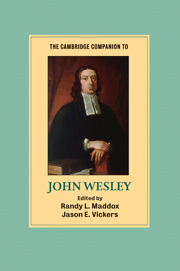Book contents
- Frontmatter
- Introduction
- Part I Wesley’s context
- Part II Wesley’s life
- Part III Wesley’s work
- 4 Wesley as revivalist/renewal leader
- 5 Wesley as preacher
- 6 Wesley as biblical interpreter
- 7 John Wesley as diarist and correspondent
- 8 John Wesley as editor and publisher
- 9 Wesley’s engagement with the natural sciences
- 10 Wesley as adviser on health and healing
- 11 Wesley’s theological emphases
- 12 Happiness, holiness, and the moral life in John Wesley
- 13 Wesley’s emphases on worship and the means of grace
- Part IV Wesley’s legacy
- Select bibliography
- Index
4 - Wesley as revivalist/renewal leader
from Part III - Wesley’s work
Published online by Cambridge University Press: 28 September 2010
- Frontmatter
- Introduction
- Part I Wesley’s context
- Part II Wesley’s life
- Part III Wesley’s work
- 4 Wesley as revivalist/renewal leader
- 5 Wesley as preacher
- 6 Wesley as biblical interpreter
- 7 John Wesley as diarist and correspondent
- 8 John Wesley as editor and publisher
- 9 Wesley’s engagement with the natural sciences
- 10 Wesley as adviser on health and healing
- 11 Wesley’s theological emphases
- 12 Happiness, holiness, and the moral life in John Wesley
- 13 Wesley’s emphases on worship and the means of grace
- Part IV Wesley’s legacy
- Select bibliography
- Index
Summary
Distinguishing religious revivalism from the cultural revitalization that often seems to accompany it, the late American religious historian William McLoughlin defined the former as “the Protestant ritual (at first spontaneous, but since 1830 routinized) in which charismatic evangelists convey 'the Word' of God to large masses of people who, under this influence, experience what Protestants call conversion, salvation, regeneration, or spiritual rebirth.” McLoughlin was describing the revivals, awakenings, and reform that he saw recurring periodically in American history, but the description fits the English evangelical revival that John Wesley led, with two qualifications. First, Wesley lived long enough to contribute mightily himself to its routinization. Second, that routinization involved not only a quickly developing tradition of preaching, but also the support of nurturing small group structures that were adapted from preexisting models and evolved into a remarkably effective organization. The revival was a “Protestant ritual,” which Wesley helped cobble together from a number of sources, contributing to its eventual institutionalization as Methodism.
- Type
- Chapter
- Information
- The Cambridge Companion to John Wesley , pp. 81 - 97Publisher: Cambridge University PressPrint publication year: 2009

